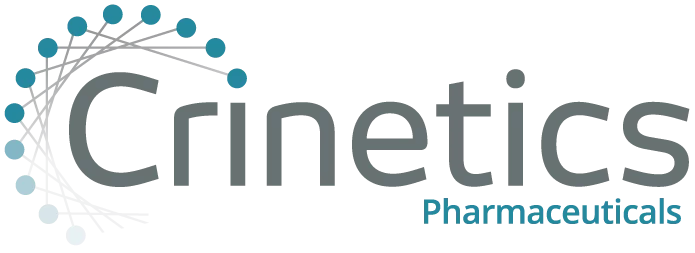Pipeline
| Discovery | IND-Enabling | Phase 1 | Phase 2 | Phase 3 |
|---|---|---|---|---|
atumelnant* (CRN04894), Oral ACTH Antagonist
ACTH acts through the melanocortin type 2 receptor (MC2R) that is primarily expressed in the adrenal gland. This is the first reported oral, selective ACTH antagonist discovered by our team in development for the treatment of ACTH-dependent Cushing’s syndrome and other diseases of excess ACTH, such as congenital adrenal hyperplasia.
*Proposed international nonproprietary name under review
TherapeuticAreas
For the Treatment of ACTH-dependent Cushing’s syndrome
ACTH-dependent Cushing’s syndrome results from a pituitary tumor that secretes excess ACTH, which in turn causes the downstream synthesis and over-secretion of cortisol by the adrenal glands. Cortisol is the body’s main stress hormone and excess amounts can cause significant increases in mortality and morbidity.
For the Treatment of Congenital Adrenal Hyperplasia (CAH)
CAH encompasses a set of disorders caused by genetic mutations that result in impaired cortisol synthesis. This lack of cortisol leads to a breakdown of feedback mechanisms and results in persistently high levels of ACTH, which in turn causes overstimulation of the adrenal cortex. The resulting adrenal hyperplasia and over-secretion of other steroids (particularly androgens) and steroid precursors can lead to a variety of effects, from improper gonadal development to life-threatening dysregulation of mineralocorticoids.
Our Research
We have ongoing efforts to advance the first nonpeptide product candidate to antagonize the peptide adrenocorticotrophic hormone (ACTH) designed for the treatment of ACTH-dependent Cushing’s syndrome, CAH, and other diseases of ACTH excess.
Phase 2
Need to Pause Hydrocortisone? Physiologic Replacement Does Not Affect AM Serum Cortisol, Bedtime Salivary Cortisol or UFC in Cushing Syndrome Patients on Block and Replace Treatment
Henrik Elenius, MD; et al.
Abstract: The 2025 American Association of Clinical Endocrinology (AACE) Annual Meeting, 5/15-17, 2025
Once Daily Oral Atumelnant (CRN04894) Induces Rapid and Profound Reductions of Androstenedione and 17-hydroxyprogesterone in Participants with Classical Congenital Adrenal Hyperplasia: Initial Results From a12-Week, Phase 2, Open-Label Study
Richard J. Auchus, MD, PhD, Peter J. Trainer, MD, Kathryn Jean Lucas, MD3, et al
Poster: Annual Meeting of the Endocrine Society (ENDO); 6/03/2024
Atumelnant (CRN04894) Induces Rapid and Sustained Reductions in Serum and Urine Cortisol in Patients With ACTH-Dependent Cushing Syndrome During a Phase 1b/2a, Single Center, 10-Day, Inpatient, Open-Label Study
Henrik Elenius, Raven McGlotten, Casey Moore, et al
Poster: Annual Meeting of the Endocrine Society (ENDO); 6/03/2024
Phase 1
Waking Salivary 11-Hydroxyandrostenedione and Cortisone as a Novel Non-invasive Test for Adrenal Insufficiency
Alejandro Ayala, Carl LaCerte, Rosa Luo, et al
Poster: Annual Meeting of the Endocrine Society (ENDO); 6/18/2023
CRN04894 an oral, nonpeptide ACTH receptor antagonist reverses ACTH-stimulated glucocorticoid secretion in rodents and humans
Peter J. Trainer, Melissa Fowler, Alan Krasner, et al.
Oral Presentation: International Congress of Neuroendocrinology (ICN); 8/10/22
Inhibition of Basal and ACTH-Stimulated Cortisol Secretion in Humans Using an Oral, Nonpeptide ACTH Antagonist (CRN04894)
Alan Krasner, Christine Ferrara-Cook, Rosa Luo, et al.
Oral Presentation: Annual Meeting of the Endocrine Society (ENDO); 6/12/2022
CRN04894: Phase 1 Multiple Ascending Dose (MAD) Preliminary Results
Company Presentation; 5/25/22
CRN04894: First In Human Single Ascending Dose Preliminary Results
Company Presentation; 8/10/2021
Pre-clinical
Effects of CRN04894, a Nonpeptide Orally Bioavailable ACTH Antagonist, on Corticosterone in Rodent Models of ACTH Excess
Melissa A. Fowler, Ana Karin Kusnetzow, Sangdon Han, et al.
Oral Presentation: Annual Meeting of the Endocrine Society (ENDO); 3/21/2021
Effects of Nonpeptide Orally Bioavailable ACTH Antagonists on Adrenal Gland Size and Function in Rats
Stacy Markison, Melissa A. Fowler, Jon Athanacio, et al.
Oral Presentation: virtual European Congress of Endocrinology (eECE); 9/8/2020
Discovery and Identification of Late Stage, Selective, Nonpeptide, ACTH Antagonists for the Treatment of Cushing’s Disease, Ectopic ACTH Secreting Tumors, and Congenital Adrenal Hyperplasia
Ana K. Kusnetzow, Sangdon Han, Melissa A. Fowler, et al.
Poster: Annual Meeting of the Endocrine Society (ENDO) Online; June 8-22, 2020
Nonpeptide, Orally Bioavailable ACTH Antagonists: Suppression of ACTH-induced Corticosterone Secretion and Adrenal Hypertrophy in Rats
Ana Karin Kusnetzow, Melissa A. Fowler, Jon Athanacio, et al.
Poster: Annual Meeting of the Endocrine Society (ENDO); March 23-26, 2019
